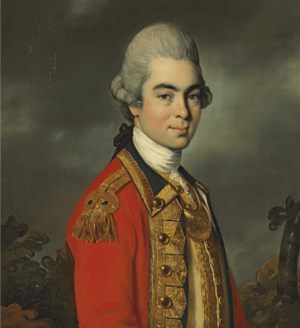James Duff (British Army officer) facts for kids
Quick facts for kids
Sir James Duff
|
|
|---|---|
 |
|
| Member of Parliament for Banffshire |
|
| In office 1784–1789 |
|
| Preceded by | Sir James Duff |
| Succeeded by | James Ferguson |
| Personal details | |
| Born | 1752 |
| Died | 1839 |
| Nationality | British |
General Sir James Duff (1752–1839) was a British army officer and a Member of Parliament (MP). He fought in the Napoleonic Wars and represented the area of Banffshire in the British Parliament from 1784 to 1789.
Contents
Life of Sir James Duff
Sir James Duff was born in 1752. He was the eldest son of James Duff, 2nd Earl Fife. Even though his mother was from a humble background, his father made sure he was well cared for. James Duff attended Keith Academy and later King's College, Aberdeen, where he earned his master's degree in 1771. His father also helped pay for his promotions when he joined the army.
Military Career and Promotions
Duff began his army career on April 18, 1769, as an ensign in the 1st Foot Guards. He quickly rose through the ranks, becoming a lieutenant and captain in 1775. In 1779, he was knighted. This was done as a proxy for his father's friend, Sir James Harris, who was becoming a knight of the Bath.
By 1780, James Duff was promoted to captain and lieutenant-colonel. He became a full colonel in 1790. His regiment was sent to Flanders to fight against the French during the War of the First Coalition. He commanded a light infantry battalion at the Battle of Valenciennes in 1794. Later that year, he was promoted to major-general.
Service in Ireland and Later Life
In 1797, Duff was given command of the Limerick district in Ireland. He played an important role during the Irish Rebellion of 1798. He managed to keep his area peaceful despite the unrest happening elsewhere.
From 1798 until his death, he was the colonel of the 50th Regiment of Foot. He continued to be promoted, becoming a lieutenant-general in 1801 and a general in 1809. When he passed away in 1839, he was the most senior general in the British army. He had served for over seventy years.
During his time in Limerick, two famous officers, William Napier and James Dawes Douglas, served as his aides.
Historical Context of Compensation
Records from the Legacies of British Slave-Ownership at University College London show that Sir James Duff received a payment. This payment was given to him as a slave owner after the Slavery Abolition Act 1833 and the Slave Compensation Act 1837. The British government borrowed a large sum of money to pay this compensation, which was eventually paid off by British taxpayers. Duff was connected to a place in Jamaica called "Jamaica Hanover 455 (Grange Sugar Estate)." He received about £4,101 in compensation, which was a significant amount of money at the time.
Family Life
On August 12, 1785, Sir James Duff married Basilia Dawes. She was the daughter of James Dawes from Jamaica. Through this marriage, Duff gained a large fortune. They had one son and three daughters together.
 | Shirley Ann Jackson |
 | Garett Morgan |
 | J. Ernest Wilkins Jr. |
 | Elijah McCoy |

